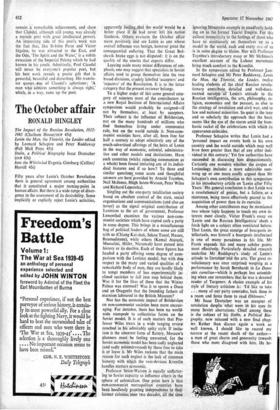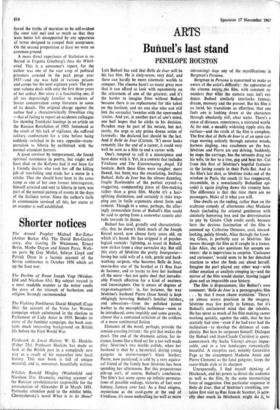The October affair
RONALD HINGLEY
Lenin the Man, the Theorist, the Leader edited by Leonard Schapiro and Peter Reddaway (Pall Mall Press 45s) Stalin, a Political Biography Isaac Deutscher (ouP 63s) Into the Whirlwind Evgenia Ginsburg (Collins! Harvill 45s) Fifty years after Lenin's October Revolution there is general agreement among authorities that it constituted a major turning-point in human affairs. But there is a wide range of diver- gence in the assessment of its desirability. Some implicitly or explictly reject Lenin's activities, apparently feeling,That the world would be a better place if he had never left his native Simbirsk. Others evaluate the October affair more positively and see Lenin as one whose overall influence was benign, however great the consequential suffering. That the Great Bol- shevik broke eggs is not disputed : it is on the quality of the omelet that experts differ.
Leaving aside many minor differences of em- phasis, one may suggest that specialists in Soviet affairs tend to group themselves into the two broad divisions, crudely labelled 'accepters' and 'rejecters' of the Revolution. It is to the latter category that the present reviewer belongs.
To a higher order of this same general cate- gory of rejecters most of the contributors to a new Royal Institute of International Affairs symposium would probably be assigned—if not by themselves, at least by accepters. Their subject is the influence of Bolshevism, not on the many hundreds of millions who find themselves living under communist rule, but on the world outside it. Non-com- munist societies have, after all, been free for half a century to adopt selectively any of the much-advertised offerings of the heirs of Lenin in the way of economic, colonial, administra- tive and other models and institutions. Have such countries (whilst rejecting communism as a whole) been found imitating any of its indivi- dual features and if so how? To these and similar questions some acute and thoughtful answers are here provided by Arnold Toynbee, Neil McInnes, Hugh Seton-Watson, Peter Wiles and Richard Lowenthal.
Singling out the one-party totalitarian society based on absolute control of the state, social organisations and communications (and also on terror) as the signal original contribution of Leninism to the art of government, Professor Lowenthal examines the various non-com- munist societies which have copied such a party in some degree. This brings in a miscellaneous bag of political leaders of whom some are still with us (Chiang Kai-shek, Sekou Tour& Nasser, Boumedienne), while others (Kemal Ataturk, Mussolini, Hitler, Nkrumah) have passed into history or its dustbin. Each of these figures has headed a party offering some degree of com- parison with the Leninist model; but with due respect to the many and varied qualities of a remarkable body of men, they are hardly likely to tempt members of less experimentally in- clined societies to fall into step behind them. Was it for the likes of these that the Winter Palace was stormed? Was it to spawn a Duce and an Osagyefo that the founding fathers of marxism laboured in the British Museum?
Nor has the economic impact of Bolshevism on non-communist societies been more encour- aging. For instance, there has been no world- wide stampede to collectivise farms on the Soviet model. It is of such matters that Pro- fessor Wiles treats in a wide ranging review couched in his admirably spiky style. If imita- tion is the sincerest form of flattery, Moscow's planners must be feeling unwanted, for the Soviet economic model has been sadly neglected (and sadly misunderstood) by those free to take it or leave it. Mr Wiles reckons that the main reason for such neglect is the lack of common honesty with which the 1.ver-devious Kremlin handles matters economic.
Professor Seton-Watson is equally unflatter- ing to Soviet capacity to influence others in the sphere of colonialism. One point here is that non-communist metropolitan countries have been heedlessly granting independence to their former colonies Over two decades, all the time
ignoring Muscovite example in steadfastly hold- ing on to the former Tsarist Empire. For this callous insensitivity to the feelings of those who have so assiduously set themselves up as a model to the world, each and every one of us is in some degree to blame. Nor will Professor Toynbee's introductory essay or Mr McInnes's excellent account of the Labour movement bring much comfort to the Kremlin.
In the symposium edited by Professor I_.eo- nard Schapiro and Mr Peter Reddaway, Lenin the Man, the Theorist, the Leader, twelve leading students of the chief Russian revolu- tionary contribute detailed and well-docu- mented surveys of Lenin's attitude to the Russian intelligentsia, the arts, philosophy, re- ligion, economics and the peasant, as also to the strategy of revolution and civil war, and to law and national minorities. So quiet is the tone and so scholarly the approach that the book seems like the eye of the storm amid the bom- bastic racket of the celebrations with which its appearance coincides.
Professor Schapiro writes that Lenin had a 'personal impact on events both in his own country and the world outside which may well have been greater than that of any other indi- vidual in this century.' Yet few authorities have succeeded in discussing him dispassionately. Certainly one wonders whether the corpus of Leninology includes a more admirable sum- ming up or one more coolly argued than Mr Schapiro's own contribution to this symposium in his introductory article on 'Lenin after Fifty 'Years.' His general conclusion is that Lenin was a revolutionary of genius, but a failure as a statesman, being more effectively geared to the acquisition of power than to its exercise.
Among other contributors may be mentioned two whose topic happens to touch my own in- terests most closely. Victor Frank's essay on 'Lenin and the Russian Intelligentsia' sheds a fresh light on a subject often ventilated before. That Lenin, the great scourge of bourgeois in- tellectuals, was himself a bourgeois intellectual is one of many paradoxes in his life. Mr Frank expands this and many subtler points most effectively. Particularly detailed research underlies Mr Reddaway's study of Lenin's atttude to literature 'and the arts. The great re- volutionary was once surprised weeping at a performance by Sarah Bernhardt in La Dame aux camilias—which is perhaps less astonish- ing when one remembers that he was a devoted reader of Turgenev. A choice example of his style of literary criticism is: 'I'd like to take . many of our party comrades, lock them in a room and force them to read Oblomov.'
Mr Isaac Deutscher was an accepter of revolution despite what were in his eyes its many Soviet aberrations. Chief among these is the subject of his Stalin, a Political Bio- graphy, now reissued with a new final chap- ter. Rather than discuss again a work so well known, I should like to record my sorrow at the recent death of the author— a man of great charm and generosity towards those who most disagreed with him. He be-
Hewed the truths of marxism to be self-evident (be once told me) and so much so that they were better left unsupported by any apparatus of terror designed to compel their acceptance. On the second proposition at least we were on common ground.
A more direct experience of Stalinism is re- flected in Evgenia Ginzburg's Into the Whirl- wind. This is a consumer's report, for the author was one of the vast crop of political prisoners arrested in the peak purge year 1937—and she was held in various prisons and camps for the next eighteen years. The pre- sent volume deals with only the first three years of her ordeal. Her story is a fascinating one, if all too depressingly familiar to students of Soviet concentration camp literature in some of its details. The original charge against the author had a characteristically Orwellian ring —that of failing to report an academic colleague for showing Trotskyist leanings in an article on the Russian Revolution of 1905. Sentenced as the result of this lack of vigilance, she suffered solitary confinement for a time before being suddenly switched to its very opposite—trans- portation to Siberia by cattletruck with the normal attendant horrors.
A good survivor by temperament, she found spiritual sustenance in poetry, but might well have died on the Kolyma had it not been for
friendly doctor who took her off the killing job of tree-felling and made her a nurse in a creche. That she should have been in the same camp as one of her own former interrogators, himself arrested and sent to Siberia in turn, was part of the normal pattern of events in the days of the Stalinist terror. Since the author's faith in communism survived all this, her status as an accepter is well established.



































 Previous page
Previous page